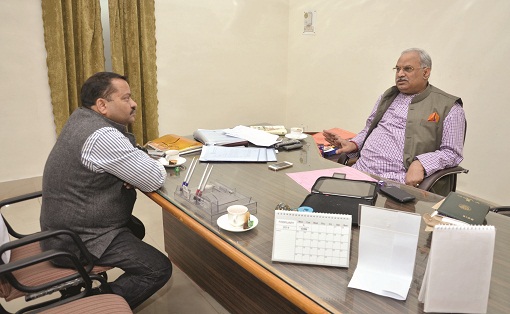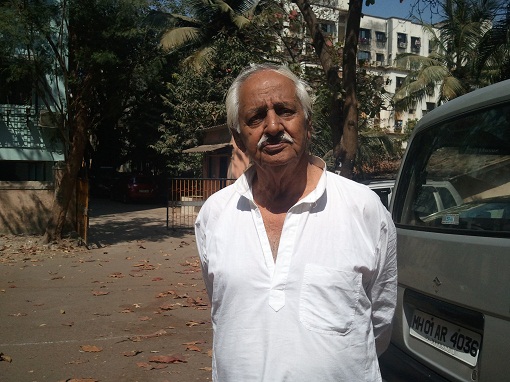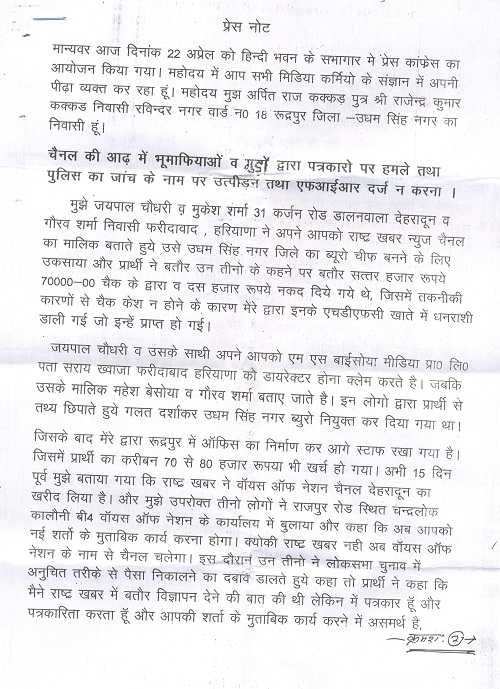Mayawati or Mulayam? That question takes on a whole new meaning for some business groups. For the last 10 years, these two politicians have taken turns to preside not only over Uttar Pradesh, but also over policy and administrative decisions that made or unmade select business groups. According to professor Rajesh Mishra, head of the sociology department in Lucknow University, as they grow in stature, emerging politicians start having economic interests of their own that goes beyond funding elections.
"This leads to active collaboration with particular business houses for whom they tweaks policies, manages bidding processes and contracts, and facilitate all direct clearances," he says. It's a symbiotic relationship, adds Professor DS Sengar of Indian Institute of Management, Lucknow. "A businessman needs certainty to function and expand."
In UP, if the Jaypee Group and Ponty Chadha have prospered under Mayawati, Anil Ambani and Subrata Roy have endured body blows. Mishra describes it as a "fi ght of the foxes". "When a certain political party assumes power, it goes out to hurt the interests of those who are seen close to the previous regime," he says.
"Corporate groups are ready for such periods of victimisation. It becomes a part of their risk-management strategy, where they multiply fast during one period and then try to preserve during an adverse regime."
Three of the five business groups profi led below have gone through a phase of phenomenal wealth creation, followed by brutal destruction or stagnation. The other two have experienced highs under Mayawati.
So, in the event of a regime change, might they be in for lows? Such is the secrecy and sensitivity of the issue that, barring Manoj Gaur of Jaypee, the others declined to talk for this story; likewise, for Mayawati's Bahujan Samaj Party. But when the votes from UP are counted on March 4, they will watch with anything but academic interest.
Manoj Gaur
Today, UP may account for just 10% of Jaypee's revenues of Rs 15,749 crore. But going forward, it will be the prime revenue and reputation driver for the group because of two road projects.
The first is the 165-km Yamuna Expressway, which promises to halve the travel time between Delhi and Agra when it opens in two months. It's a build-operate-transfer (BOT) project. Jaypee is not charging anything to build the expressway. Instead, it will collect toll on the road for 35 years, and then hand it back to the government.
More importantly, the UP government has given it 6,000 acres of land on either side of the road on a 90-year lease. It is developing townships at five locations: two in Gautam Budh Nagar, and one each in Noida, Aligarh and Agra.
Jaypee plans to build houses, offices, an international airport and a sports complex on it. The development of it could yield Rs1,35,000 crore in revenues over the next 20 years, says Manoj Gaur, executive chairman, Jaypee Group.
Jaypee bagged the project in 2002, when the BJP was in power. But it was the Mayawati government that helped Jaypee acquire land, at fixed rates and at a time when land acquisition by governments had become a hot potato.
Flaying this land acquisition, opposition parties in UP say the government paid owners the price of agricultural land, not commercial land.
"Jaypee was favoured brazenly, rules were bent for them," alleges Samajwadi Party spokesperson Rajendra Chowdhry. "Whatever the government did was well within the bidding agreement," replies Gaur. Chowdhry also alleges that Anand Kumar, Mayawati's brother, holds benami shares in the Jaypee Group.
"If the SP comes to power, it will probe the matter," he adds. A November 2011 research report of Edelweiss Capital said: "Jaiprakash Associates (holding company) is exposed to the risk of any political upheaval or any exigencies in UP."
The second road project, the Rs 40,000 crore Ganga Expressway, is structured along similar lines, but is bigger. Jaypee has the right to develop 30,000 acres in eight townships on this road connecting Noida and Varanasi.
The 1,047-km project is currently in limbo, with the Allahabad High Court in May 2009 asking the state government not to go ahead with it without environmental clearances. Gaur is optimistic. "If people are happy with the Yamuna project, they may clamour for the Ganga project.
That's the only hope," he says. Despite the SP threats, political observer Paranjoy Guha Thakurta says: "Any change in power does not necessarily mean the projects will be in jeopardy."
Jaypee has prospered under all regimes: it bagged the Yamuna Expressway under BJP, it bought a cement company through a court-monitored auction during Mulayam's regime and thrived under Mayawati. "We will work with the government," says Gaur.
Anil Ambani
After his split with brother Mukesh in 2005, Anil Ambani identified the power business as his vehicle of growth and UP as his building ground. He shared a relationship of business and bonhomie with Mulayam and his number two, Amar Singh. He attended the swearing-in ceremony of Mulayam, whose party later supported Ambani's candidature to the Rajya Sabha in 2004.
"Ambani's relationship with the Samajwadi Party was more than political allegiance," says Paranjoy Guha Thakurta, journalist and political observer. "He was part of the extended SP family. Amar Singh wrote so many letters to the Prime Minister brazenly batting for Ambani (in the bad times)."
In the good times before that, the cornerstone of Ambani's plan was an 8,000 mw gas-based power plant in Dadri, but it tripped at the land acquisition stage itself. The Mulayam government acquired 2,500 acres on Ambani's behalf citing "public purpose".
In 2008, in the wake of Singur and Nandigram, the propriety of government buying land for companies became an issue. The Dadri land acquisition ended up in court. In December 2009, the Allahabad High Court, describing the Mulayam government's move as a "colourable exercise of power to bypass rules", asked Reliance Power to return the land to the original owners.
Alleges Congress MP, Raj Babbar, who led the agitation against the Dadri project: "The land acquired was far in excess of what was needed for a project of that size." A multi-product special economic zone (SEZ) in Noida proposed by Ambani was also grounded.
Explaining this decision taken in the second cabinet meeting of the Mayawati government in May 2007, state cabinet secretary Shashank Shekhar Singh said the SEZ did not meet the guideline of being on a contiguous piece of land, having one entry and one exit.
"It was found to have been proposed on two pieces of land, with a road dividing the plots," he had said. In UP, Ambani presently only has a 900 mw power plant in Rosa (bought from the Aditya Birla group), and two road projects bagged in 2011 on which the planned investment is Rs 3,500 crore.
In his group's scheme of things, UP is a small contributor. It could have been bigger. The continuing presence of Mulayam could have seen more of Ambani's ambitions in the power business being realised – at a projected 5,000 mw at the end of 2012, Reliance Power is behind its 2017 target of 35,000 mw.
If Mulayam returns, that could change. Ambani still has land in Dadri, but no gas. Also, a person close to the group says Mayawati is less hostile to "enemy business groups" than before. "She is supportive of Rosa," he says, not wanting to be named. "She wants to project herself as the future prime minister."
Subrata Roy
Subrata Roy's Sahara Shaher in Lucknow stands adjacent to Mayawati's magnum opus in concrete, the Ambedkar Memorial complex. And it bore the scars of Roy's muchflaunted friendship with Mulayam.
In June 2007, a month after Mayawati took charge, the Lucknow Development Authority served a notice to Sahara for starting construction on a multi-storied building inside the 270-acre complex without having the layout cleared by the agency.
Mayawati, many said, did not want the tower to overshadow the upcoming domes of the Ambedkar Memorial. That may or may not be true, but that Sahara could construct a multi-storied building without its project map being sanctioned shows its clout in the previous Mulayam government.
More state interventions in construction followed. In June 2008, a 1.2 km long boundary wall of Sahara Shaher encroaching on public land was razed and replaced by a road, as envisaged in the Master Plan. These interventions are more symbolic, than financial.
In the way the Sahara Group has grown, it has reduced the scope for a witch-hunt against it in UP. In its real estate and media businesses — chiefly a Hindi newspaper and a TV channel — it has a significant exposure in the state. That's not so in entertainment and hotels, where it has diversified beyond.
Although Lucknow is its registered headquarters, it has moved significant operations to Mumbai. Still, UP remains important for Sahara because its roots are there. The state was its mainstay in raising deposits from individuals, till the Reserve Bank of India banned it from doing so on June 4, 2008.
The same day, the-then UP chief secretary Atul Kumar Gupta wrote to the RBI: "…even though the RBI order has been passed to protect the interests of depositors, it is not doing enough. If the depositors panic, which appears almost a certainty, it is certain to create a law and order situation."
On June 6, Mulayam met Mayawati at her residence, their first such meeting in 13 years, as part of the panel to select the chairman of the UP Human Rights Commission. The same day, Gupta withdrew his letter to the RBI.
Sahara India acquired huge land tracts during Mulayam's tenure and announced 11 townships, though it started building only in 2007.
A person with knowledge of the group's real estate business says, in Mayawati's tenure, Sahara has completed just two projects. "It would have completed six more, which are works in progress, had Mulayam been in power," he says, on the condition of anonymity.
"Land titles took a long time." Following the exit of common friend Amar Singh from the SP, Roy and Mulayam have been seen together publicly less. In December, Roy attended the wedding of Mulayam's younger son — their first appearance together after a long time.
Kushagra Bajaj
Sugar manufacturers in UP, India's sugar bowl, take Mulayam's name with reverence. They detest Mayawati equally. If during Mulayam's tenure (2003-07), the procurement price of sugarcane increased by 25%, it has doubled during Mayawati's reign.
Soon after taking over in 2007, Mayawati scrapped a Mulayam scheme to encourage new sugar capacity. That 2004 scheme gave generous incentives – like capital subsidy, entry tax exemption, and reimbursement of transport cost, stamp duty, registration charges and purchase tax – for 5-10 years to companies investing above Rs350 crore.
All the biggies rushed in, none more than Bajaj Hindusthan, whose entire business is in UP. It catapulted from contender to market leader. During Mulayam's tenure, Bajaj increased capacity fivefold, with the chief minister even inaugurating some of those new plants.
Since 2007, its capacity has inched up 9%. Before this expansion, Bajaj was restricted to Western UP, where sugarcane availability was an issue because of many mills.
The expansion, steered by young Kushagra Bajaj, saw it gatecrash into eastern UP, a stronghold of Balrampur Chini Mills, the thenleader by capacity.
"Amar Singh's muscle power, coupled with his (Kushagra) own financial strength, helped Bajaj wrest the number one spot," says a sugar analyst from a Mumbai-based brokerage, not wanting to be named. "Bajaj invested Rs4,500 crore during Mulayam's tenure, Balrampur Rs 2,500 crore."
When the scheme was scrapped, with retrospective effect, UP cabinet secretary Shashank Shekhar Singh said the policy was not comprehensive and that certain incentives were not needed.
In Mayawati's time, Kushagra has gone slow on sugar, but has pushed on power. The company has invested Rs 2,500 crore in five coal-based power plants, of 90 MW each at five of its sugar factories, for captive use. It has also announced an investment of Rs12,000 crore in new thermal power plants in UP till 2017.
An executive of a rival sugar maker says the agreement under which Bajaj will supply 90% of its thermal power to UP, at a fixed tariff, shows the changing equation between Bajaj and Mayawati.
"Mayawati is desperate to add power capacity, where Bajaj is putting serious money. Their coming together is need-based," adds the analyst quoted above.
The executive says Bajaj would like Mulayam to be back, though even Mayawati won't be a source of distress. "He will adjust with whoever is in power," he says. "After all, all its (Bajaj's) business has been in UP for 75 years."
Ponty Chadha
In a first in the liquor business in India, in March 2009, the Mayawati government decided to hand the wholesale end, and the retailing in some plum districts, of the Rs6,000 crore liquor trade in UP to one entity. The entity chosen, through a tender process, belonged to Gurdeep Singh Chadha, better known as Ponty Chadha.
"Ponty who," was the public refrain. Outside of UP, it still is. "The policy (of awarding the liquor licences) was tailormade for Ponty Chadha," alleges Samajwadi Party spokesman Rajendra Chowdhry. "He has benefited the most in Mayawati's rule."
Chadha declined comment on this charge, though he had told ET in a rare 2009 interview: "We do business according to the rules and guidelines put forth by the state." In the same interview, Chadha reluctantly revealed that his group's size was Rs 6,000 crore.
Of this, he said, Rs 4,000 crore came from the liquor business, with his group having operations in six states. Much of the remaining came from real estate, under the Wave brand, which is currently developing perhaps the largest integrated township in India, over 4,500 acres in Ghaziabad.
The group is also developing 152 acres of commercial land in the heart of Noida, where finding such tracts is difficult. Chadha started business in Punjab, where he was reportedly close to the Congress government during 2002-07.
But he made his millions in UP, first under Mulayam, who inaugurated his Wave mall-cum-multiplex in Lucknow, and then under Mayawati. In 2010, he bagged five of the 11 sick sugar mills sold by UP. "He got the mills RsRs 276 crore, when their market price was Rs 1,000-1,500 crore," alleges Congress leader VM Singh.
"The Mayawati government ensured the bidding process was manipulated to favour Chadha." The sale of all mills – five were bought by a central PSU and one by a private player – has been challenged in the Allahabad High Court. In spite of also being a film producer, Chadha keeps a low profile and is rarely seen publicly.
Yet, in March 2009, a liquor industry veteran who has engaged Chadha in business deals in the past, jokingly said: "He certainly appears more influential than the Mughal empire in its twilight years."
ET में 12 जनवरी को प्रकाशित Kausik Datta और Man Mohan Rai की रिपोर्ट





